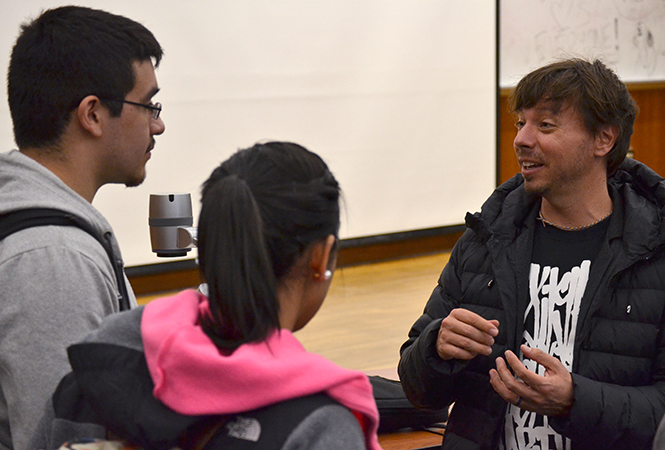Mexican architect talks about cultural design challenges
Architect Leonardo Diaz-Borioli (right) talks with freshman architecture students Rebecca Alanis and Felipe Valadez after he presented some of his work Tuesday, April 15, 2104 in Bowman Hall.
A principal architect of Estudio 314, a Mexican design studio, shared his experiences in working in the drastically different sociopolitical environment of Mexico with architecture students at a presentation Tuesday night.
“There’s some very high inequality,” Leonardo Diaz-Borioli said. “Roughly 40 percent of the population gets 10 percent of the gross domestic product, and the wealthiest 10 percent gets 40 percent of the GDP, so that’s very, very unequal and makes working in the public sector very difficult because the people are generally angry.”
Diaz-Borioli gave the students in attendance an overview of his work with both small- and large-scale urban projects in Mexico with a focus on improving the public sector and infrastructure in different regions of Mexico.
“We’ve had an alternating focus for the lecture series this semester,” said Steve Rugare, assistant architecture professor in the College of Architecture and Environmental Design. “Some lectures have been sort of general pictures of what a global architectural environment looks like and what their underlying conditions and political economy are. Some [lectures] have been more closely focused on what it’s like to practice in various places in the world, and today’s will have a little bit of each.”
Diaz-Borioli’s lecture served as the fourth in the College of Architecture and Environmental Design’s Spring 2014 lecture series “Global Geometries.” He spoke to an audience of approximately 60 students in Bowman Hall.
Diaz-Borioli shared insights from projects he has worked on that demonstrate the challenges Mexico’s political economy forces architects to consider.
He spoke about a photography competition Estudio 314 hosted in which citizens were able to submit photographs that illustrated the problems with Mexico’s infrastructure, Diaz-Borioli said.
“No resources go to building public space — to build the social fabric that is needed for the country,” Diaz-Borioli said. “That’s why we began to make this competition, to have people go out and make a representation of the city that will be useful in showing decision- makers what is important for the city’s budget.”
The final lecture in the “Global Geometries” series will feature Keller Easterling, a professor of architecture at Yale University, who will present on “EXTRASTATECRAFT,” a project focused on investigating the changes in the globalizing world, on Tuesday in the Kiva at 5 p.m.
Contact Justin Sheil at [email protected].



